Tuesday 22 May 2007
Module 5: Concepts & the Internet
I loved reading Imagining the Internet: Predictions Database also, makes you think doesn't it?
:)
Module 4: Evaluating The Web Task
Internet Tools for the Advanced Searcher
http://www.philb.com/adint.htm
Phil Bradley, last updated January 2005
(accessed May 22, 2007)
Phil Bradley's website provides us with an excellent resource of information. It's overall purpose is to help and guide us into furthering our advanced net skills. The main subjects discussed in this site is focused on Search Engines, how to find them, how to use them, how they work and the different kinds there is and in general how to maximise the most effective ways of using them.The site in itself is set out quite clear providing 'snapshots' on alot of the links and it's relaxed clean look makes it appealing to the eye. He provides us with search categories which include virtual libraries, weblogs, intelligent agents and the techniques used for each. Each topic is described in alot of detail. He also steers us in the directions to take when utilizing these search tools. The links provided for each topic blend well with the topic header and the information is therefore very viable... the site is mostly text based and also provides us with a host of external links to explore other topics that may be of interest.This page was last updated January 2005 with the main page last being updated February 2006 so the information is still valid and of great use and on par with today's search tools. Phil Bradley is an Internet Consultant and information specialist who writes various articles and publications. He is a speaker at conferences and can run courses for students and staff on Internet related Topics. He always designs websites and is a Search Engine Optimizer and travels around the world frequently.
In future i would use my own snapshot of the site to refer back to because it's familiar to me because i have visited the site before and got to know it fairly well, also in my Bookmark it is easily accessible.
For external users i more think my annotation would be a more appropriate source of reference because in one small chunk of information i have described the website, it's features, my thoughts on how useful i have found it and the basic contents in it and i have provided a link to the site as well as some background information on it's author.
Monday 21 May 2007
Module 4: Organising Search Information Task
Choose the best three sources found in the previous task & record the following information about those sites:
URL.
Author,
Institution,
Blurb/ summary / screen shot (this can be a direct copy of an appropriate abstract or introductory paragraph on the site: but make sure you record and reference it as such)
The Author of this site is CIESE and it is hosted by Stevens Insititute of Technology, Center for Imporved Engineering and Science Education. This tutorial is intended for use by those who have an advanced knowledge in basic web browsing and it is recommonded for those that want to enhance their knowledge of their web browers and it provides instructions on how best to explore all options.
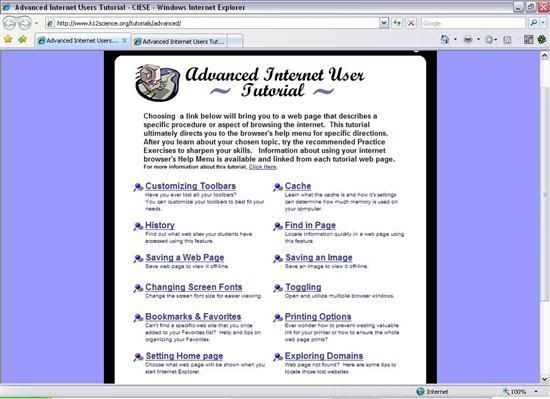
2. http://www.internet.computertechnicalcentre.com/terms.htm
Lisa Cohan is the Author of this site & i like it because it is really great in fully exploring search engines as it provides links to large amount of them, including meta search engines.
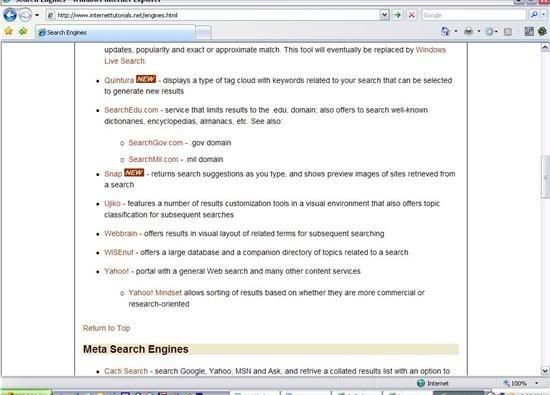
3. http://www.philb.com/adint.htm
Phil Bradley is the author of this site and it's Another great tool for finding search engines and clues on effective ways of maximizing their use and also the types of search engines there is, it also inlcudes a list of search engines, weblogs, intelligent agents, virtual libraries.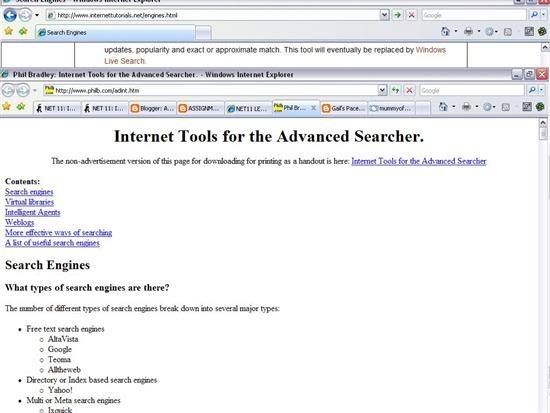
For this task i utilized Bookmark Buddy and whilst i can see it's advantges i cannot say i am impressed and will probably not use it after completing this unit, PageSucker on the other hand i adore and will use it alot and have used in this later part of the unit. Below is a screenshot of my bookmarks for this task.
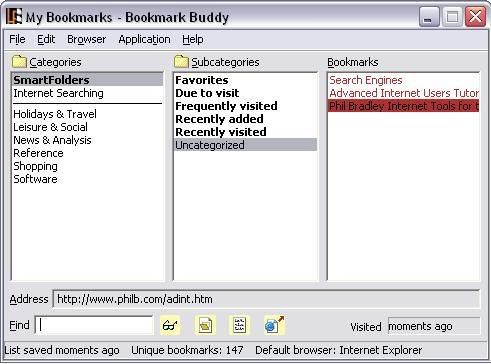
Progress
My confidence in essays has always been at a low, even in high school, so it's a struggle to overcome it esp after seeing the good work some of the other students have done already.
But oh well, keep trucking as they say and i can only do my best.
It's now just a few days until we finish and it's exciting, I'm very disappointed about missing the cutoff date for SP2 but with Dylan and myself sick it slipped my mind, but oh well, August it is.
ta ta for now :)
Module 4: Boolean Search Task
Taking the same key words of your last search, think about how you would best search for the following:
The biggest number of hits relating to these key words - Using Google and using the search term 'advanced Internet users' it came back with 117,000,000 hits. I then searched for 'advanced and Internet and users' and got 298,000,000 hits and Google tells us that when you put 'and' in it's unnecessary as they "include all search terms by default". So basically what we see is that using 'and' in any searches means that it will search for all terms in one hit, which is good but also can give you very broad results so it's not always useful.
Sources relating to skills-based information on these key words - Now when i search for 'advanced Internet users and skills i got 298,000,000 hits and by using and skills this ensured that my results would be more geared towards skills related results.
Information coming only from university sources - For this one i used Copernic Agent and searched the term 'advanced Internet users edu' , whether I've done this ok or not i don't know but i got 51 results which all related to academic related.
Interesting isn't it how results can differ by how you change the words you put in by simply adding an and or an or , a real eye opener.
Monday 7 May 2007
Module 4: Search Engine Task
- Choose your most commonly used Internet search engine and do a search for the words: advanced Internet users. Record the first hit and number of hits in your learning log.
I used Google which is the Search Engine that i use everyday and got 102,000,000 hits and the first 5 Google Hits i got were:
Advanced Internet Users Tutorial - CIESE
- Advanced User's Internet Training Resources
Advanced Internet Users, School of Continuing Education ...
http://newsroom.cisco.com/dlls/global/asiapac/news/2005/pr_09-21.html
Msen Advanced Internet Users Links Page
- Using Copernicus or similar, set it up to search at least three search engines (including one that will search the 'deep web') and repeat exactly the same search, record the number of hits in your learning log and compare to your first search. What differences did you notice? Why? Which search, on first glance gave you the most promising results?
Using Copernic Agent i searched 10 search engines and came up with 33 results, and as we can see that's a major difference to my Google search and you can't help but ask why such a difference.? Well from what i can see and from what i have learnt about Meta search agents such as Copernic in this Unit, single search engines such as Google gives us a lot of results, but Copernic gives us more specific and defined results, hence the smaller amount of hits.
The first 5 Copernic Hits are in the screenshot below (click to see full sized view)
Module 4: Downloading Tools / Plug-ins Task
All 3 seem to me to take more time when using them which would make more time I am on my PC, so I'm not too sure I like them, but I very much see the advantage of Pagesucker as I am on Dialup.
Tuesday 1 May 2007
Web Ethics : Top Tips for Web Bloggers
- Only publish facts that you know to be true, if you don't then just note your thoughts on it instead then.
- If material on your subject already exists online then link your viewers to it, because like me, they will like to read it and don't like links to pages that agree with everything you say, readers like to have a view from both sides and if you don't link it then provide the name of the reference so that users if they so choose can go find it themselves.
If anything at all that you have put in your document ie: links etc you have found to be untrue, then make notes of it on the document.- Make every entry you write as if it cannot be changed, it will save alot of trouble that may occur down the line for people that may have used you as a reference and in general to keep your professional integrity.
- Be upfront with your readers, if any information about you can reflect against what you write in your document and that way it gives the reader a chance to decide for themselves on how much stake they put into your words.
- Topics of a serious nature should be clearly marked as such and the type of site the information is coming from also.
Module 3: Blog Task
Well i did it and it was very easy, i enjoyed it and may even utilise it in the future.
Below is a screenshot of the actual program on my pc and a screenshot of the blog webpage.
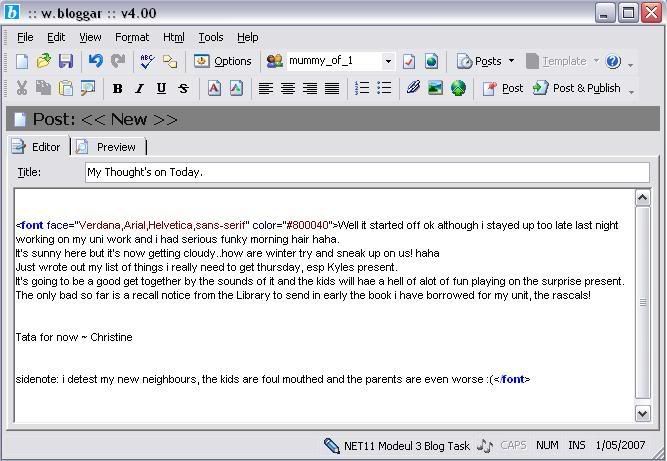
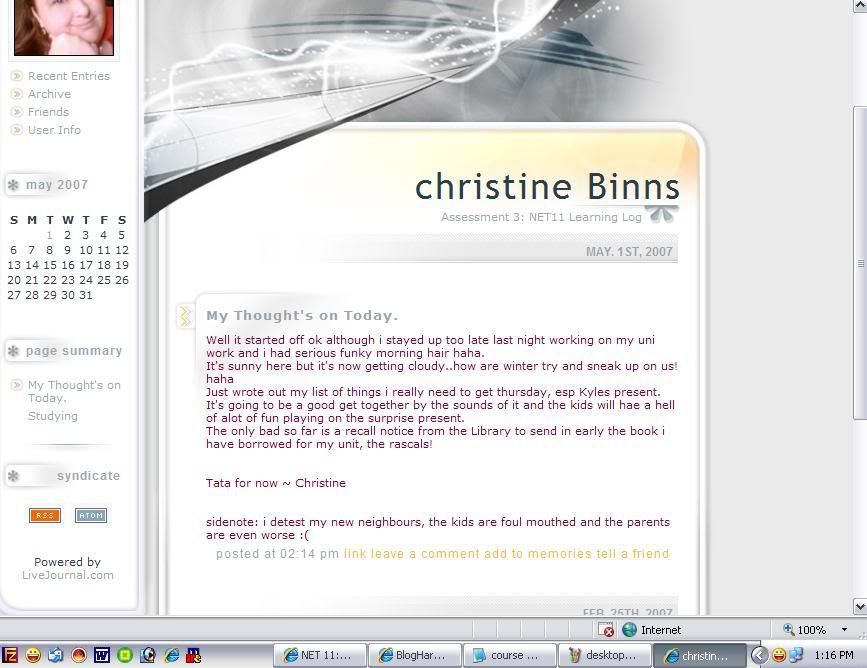
Module 3: FTP to my Oasis space.
After about half a day of confusion i finally realized i had my files in the wrong place, once i placed them under the WWW folder, where they should be, and then i downloaded the VPN it worked and my page is now viewable and on the plus note this has reallly helped me grasp the whole FTP and how to use it.
My address is : http://www.student.curtin.edu.au/~13778798/index.html
I used the FileZilla client.

